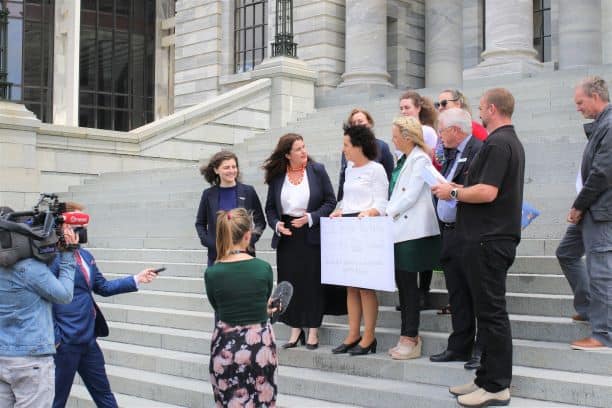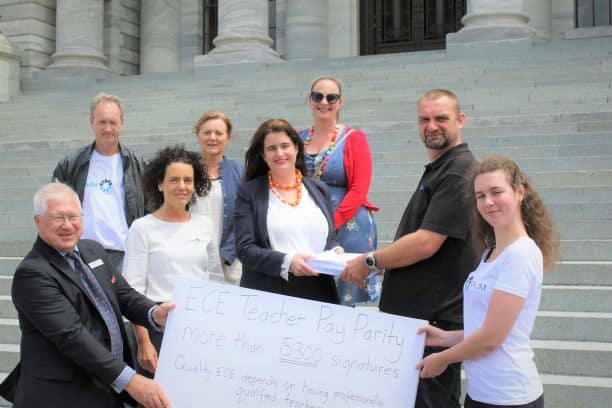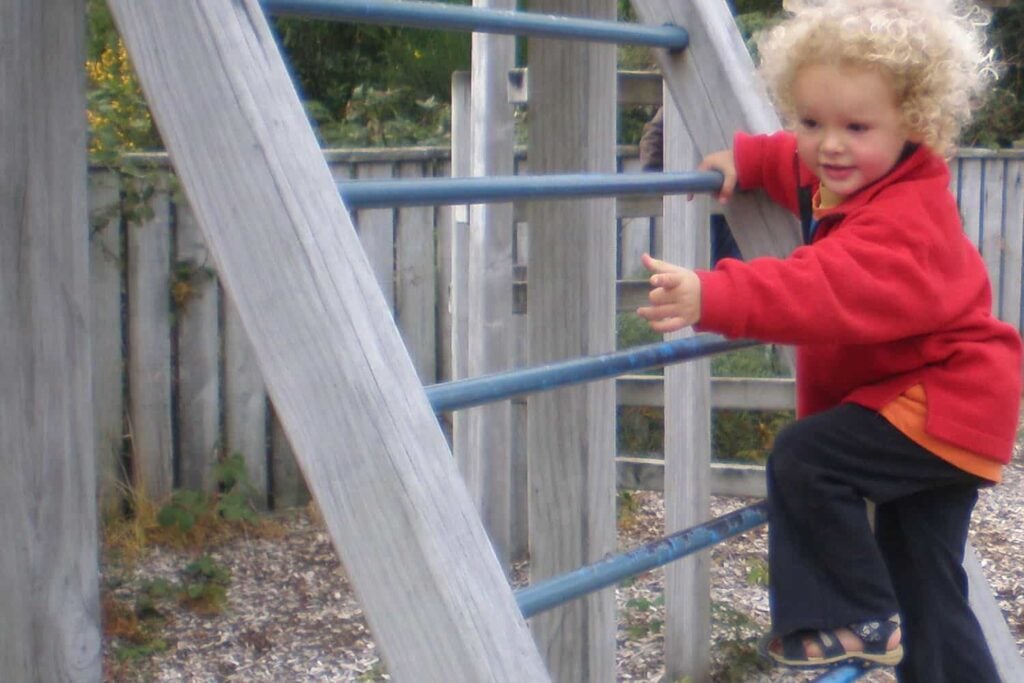Expert testimony on pay parity.
The letter below by Dr Sarah can now be made available as the Select Committee heard from James on 22/07/2020.
A live stream of James’ presentation to the Select Committee is available from the Pay Parity facebook page here
19 June 2020
Dr Parmjeet Parmar
Chairperson
Education and Workforce Select Committee
Tēnā koe Dr Parmar
This letter provides expert testimony for the Education and Workforce Select Committee related to the petition of James Lochead-MacMillan with more than 15,000 signatures requesting the House of Representatives urge the Ministry of Education to ensure pay parity with primary teachers for all early childhood education (ECE) teachers working in any licensed publicly funded provider.

Government recognises the equality of qualified and certificated teachers in schools and ECE by providing pay parity for teachers in kindergarten association owned kindergartens with school teachers. Therefore, the issue is about making sure that pay parity is extended to all qualified and certificated ECE teachers whatever publicly funded ECE service they work in.
The benefits that ensuring pay parity for all ECE teachers would bring for children, for families – and for society, are clear. ECE services that provide pay parity attract and keep high quality teachers, who grow as a team and become highly experienced, high functioning, and cohesive teams. Because of this, teachers can constantly improve the benefits the service provides for children and families from one year to the next.
Staff stability is linked to child outcomes in the psychological literature on ECE quality. Children who form strong caring reciprocal relationships with their teachers have improved outcomes. But, when staff turnover is high babies, toddlers and young children can struggle to form trusting caring relationships with their teachers. Constantly changing teachers means low quality education for children because it takes time to get to know each child well – their interests, needs, personalities, and learning dispositions.
At present the sector is at the lowest point that I have ever seen it at. A large part of this is due to how the ECE workforce is treated. Children are affected because when teachers are overworked for what they are paid and not shown respect by being paid their value, it becomes harder and harder for teachers to provide quality learning experiences for children, keep them safe and prevent harm. The sector has lost many skilled teachers due to low pay and it cannot afford to lose any more.
Including all ECE teachers in pay parity would finally complete the process started three decades ago of bringing early childcare into the education system. A strong directive from the House of Representatives needs to be given to the Ministry of Education to act swiftly to end wage discrimination against ECE teachers.
In this letter I first provide brief details of my background. Then I present an overview of the present situation and I look at how this situation came about. This is followed by discussions of the government’s role in setting ECE teacher pay, the cost of pay parity, strategies to get around providing pay parity, and whether Government can trust providers to use funding to give their teachers pay parity. The letter concludes with quotes from people who signed the petition and from publicly funded providers representing community and privately-owned services.
Brief details of my background
My experience in ECE spans more than 30 years with each role that I have undertaken requiring a different perspective (e.g. a free kindergarten union national student representative, chief executive of a for-profit childcare employer lobby group, and Ministry of Education contracted writer of the Best Evidence Synthesis on “what works in early childhood teaching for maximising children’s learning outcomes and reducing disparities amongst diverse children?”). I am an internationally recognised researcher, and I have been a crèche worker, head kindergarten teacher, teacher trainer, and university academic. Today I am the chief executive of ChildForum – a national think tank and organisation representing ECE services and working alongside teachers, families, and researchers. I am also a mum of 5 children.
Overview of the present situation
Teacher recruitment and retention is now a problem in ECE like it never has been before. Policies to address workforce issues have not worked. For example, funding recruitment companies to source teachers from overseas results in more NZ teachers losing or leaving their job, and puts migrants, who need to keep their job to stay in NZ, at risk of exploitation.
A major recruitment drive for people to train to be ECE teachers is not a solution because a degree in teaching takes 3 to 4 years to complete. There is no guarantee that graduates will apply for and stay in ECE teaching positions given the low pay levels and need to pay off their student debt. People can see that they would be better off to get a primary teaching qualification than an ECE one. A primary teaching qualification can still enable them to be a ‘person responsible’ in an ECE centre since the recent loosening of qualification requirements has made it possible for centres to have no ECE qualified staff supervising children.
ECE services have lost teaching staff, not because they do not want to work in ECE, but because they cannot afford to stay working in ECE. Pay parity provides a solution to the workforce woes – a solution that will work. (see an Open Letter from ECE teachers – link)
Pay parity for all ECE teachers can be put in place easily and efficiently. The Ministry of Education has established a mechanism (called salary attestation) to set pay rates and ensure provider accountability for public funds.
However, at present the salary attestation process is used only to ensure teachers are paid a minimum wage and ignores higher qualifications, experience, and position. The message this gives to service providers is that teachers can be paid below what they would receive if working in a kindergarten or school setting. On 11 May 2020 the Minister of Education stated that the 2.3% funding increase in this year’s budget “will go to improving the pay of up to 17,000 qualified (ECE) teachers” and that the further 1.6% would help “to meet other cost pressures, including the salary cost pressures”. In its 21 May 2020 Bulletin to service providers the ministry showed it does not disagree with the message that a minimum wage rate gives to service providers: “While the intention of the funding is to improve teacher salaries, services that already pay all their teachers above $49,862 are permitted to use the additional funding in other ways, should they choose – for example, on deferred maintenance or resources for children.” This highlights that, so long as the attestation rate is one simple figure then the Minister’s clear intention to deliver funding for pay increases can be easily subverted by providers wishing to spend the money elsewhere.
How this situation came about
On 3rd June 2020 the Minister of Education Chris Hipkins said in a live Facebook video that a reason why ECE teachers must continue to accept lower pay than colleagues in kindergartens and schools is that money is needed to give more financial support to people affected by Covid-19. There was no mention of expecting the same level of sacrifice from kindergarten and school teachers. Also, that factor did not stop the Minister granting substantial pay increases to teacher aides. This is an example of the bias against ECE teachers that stems from nothing more than a quirk in the history of the development of the sector which has seen the pay expectations kept low of all ECE teachers except for kindergarten.
Back in the day, crèches and day nurseries were not part of the education system. Working in a crèche I would get no or little pay because you were simply helping to care for children out of the goodness of your heart.
In contrast, kindergarten teaching was regarded as a professional job and paid accordingly. It was necessary to hold a teaching qualification obtained through study at a Teachers’ College. As a kindergarten teacher, engagement in ongoing professional development was required. An annual salary was paid by the Department of Education, the government superannuation scheme was available to kindergarten and school teachers alike, and you would get the same term breaks as school teachers.
From the mid-1980s steps were taken to close the structural dichotomy between child ‘education’ and ‘care’ services. In 1986 responsibility for the administration of childcare services was transferred from the Department of Social Welfare to the Department of Education. Day nurseries and crèches became educational services. In 1988 conjoint teacher training for free kindergartens and childcare was introduced. The length of teacher education was extended from two to three-years, bringing training requirements for ECE in line with primary student teacher education.
These changes meant that lower pay for ECE teachers compared to primary teachers based on teachers having a lower level of training could no longer be justified. Furthermore, a growing body of research evidence challenged the perception that teaching young children was lower skilled work than teaching children who were older.
Therefore, in 2001 Hon Trevor Mallard formed a ministerial working group to plan the introduction of pay parity for teachers in kindergartens with primary. This was achieved in 2002 using the Kindergarten Teachers, Head Teachers and Senior Teachers Collective Agreement (KTCA) to provide a pay scale that reflected the pay scale of primary school teachers. At the same time, it was signalled that work would be done to extend pay parity to all ECE teachers who were not party to the KTCA.
The Education (Early Childhood Services) Regulations 2008 brought all early childhood services in NZ under the same legislative umbrella, replacing for example the Kindergarten Regulations 1959, the Childcare Regulations 1960, and the Education Home-based) Care Order 1992/ 2016.
Kindergartens had been defined previously in legislation as being sessional ECE services, however, the introduction of the 20 Hours Free ECE funding scheme saw a shift toward relicensing as all-day education and care centres since a greater amount of funding was provided for these services. Until recently Ponsonby Kindergarten in Auckland was the last remaining sessional kindergarten and it has now changed too.
Note also that free kindergartens are not part of the public education system. The law requiring kindergartens to be donation-based, providing a free education to children regardless of parent ability to pay was changed in 1990 to enable kindergartens to charge fees as childcare centres could and did. Regulation 14 of the Kindergarten Regulations 1959 was revoked and replaced by Education Amendment Act No. 3, 1990) stating that fees may be charged in respect of the attendance of any “child at any kindergarten (whether or not it is, or is known or described as, a free kindergarten) within the meaning of the Kindergarten Regulations 1959.”
Debate has raged in parliament over the role of the government in supporting kindergartens and kindergarten teachers. When the National Government took Free Kindergarten Associations out of the State Sector Act in 1997, the associate education minister argued that “the claim that kindergartens were the jewel in the crown of the early childhood sector was an insult to the rest of the sector… This ignores the commitment other people in the sector have to early childhood education. It ignores their training and qualifications.” He added that “Government can’t privatise what it doesn’t own … kindergartens actually want to own the Crown-owned properties they currently lease. The Government has started work on identifying property that could be transferred to early childhood associations”.
In 2000 the Labour Government put kindergarten teachers into the State Sector Act in a clause within the Employment Relations Bill. The State Services Minister said that National had taken the kindergarten associations out of the State Sector Act because it did not want to fund pay increases negotiated by the State Services Commission. “By doing so, they removed a very important benchmark for the funding of all ECE”, he said. He added “The Government owns the majority of kindergartens and there is certainly a public perception that we are a major partner in the kindergarten sector.” In fact, the Government does not own kindergartens. They are owned by incorporated societies or trusts.
David Haynes has investigated the treatment of ‘free kindergartens’ in respect of awarding these services higher funding. According to the Ministry of Education it does not use the coverage of the KTCA as a factor in its funding decision. It asks service providers if they wish to be treated as a free kindergarten association or another type of service and then it decides on what level of funding the service providers are eligible for.
The ministry told Mr Haynes that “service providers would, for kindergarten funding purposes, typically be legally named and constituted as free kindergarten associations. Often this is in the form of a registered charity or an incorporated society.” However, he notes that the ministry provides the ‘kindergarten’ level of funding to several organisations that are not, and in some cases have never been, called a ‘free kindergarten association’. To take just one example, the Auckland Kindergarten Association receives the ‘kindergarten’ level of funding even though it appears never to have been called a “free kindergarten association”, it was dissolved between 12 December 2001 and 31 May 2002, and the objects in its constitution refer to “early childhood education and care” not to “establishing and maintaining a kindergarten”.
More recently, Work and Income determined that teachers employed in ‘free kindergartens’ were not state sector employees and therefore could not receive the Covid-19 wage subsidy. In an analysis of the current legislation Mr Haynes has concluded also that kindergarten teachers are, in fact, no longer State sector employees.
Today, there is no justification for singling out ‘free kindergartens’ for higher funding compared with other ECE services when in fact the ‘free kindergarten’ as it was known is now akin to the moa. Indeed, in the eyes of the ECE licensing regime ‘a free kindergarten’ is akin to the unicorn – mythical.
Yet, the Ministry of Education persists in allowing access to funding for pay parity to Kindergarten Associations only. This is a problem for three reasons. First, it does not support excellent outcomes across the teacher-led ECE sector since Kindergarten Associations are given the upper-hand in attracting and retaining qualified teachers to the disadvantage of other ECE services and the children in these services. Second, it is inequitable as it supports differential treatment of teachers based on nothing more than the history of the publicly-funded service they work in. Finally, it is inconsistent with the government’s policy as expressed in He taonga te tamaiti, the early learning action plan (ELAP). ‘Equity from the start’ is a key value in the ELAP. Providing only some ECE services with preferential levels of funding in order to pay their teachers on par with school teachers, works strongly against achieving equity and is destructive of the government’s ability to deliver on the ELAP’s objectives.
Why ECE teachers need Government to act on their behalf
ECE teachers are a vulnerable group. Outside of kindergartens, few teachers belong to a union. Also, their employers do not control the levels of government funding available and thus cannot bargain in good faith. Therefore, collective action in the form of striking, as school teachers can do, is not an option.
It is not okay to financially exploit ECE teachers by taking for granted their kindness, the love they have for children, and the support they have for families by paying them lower than what a teacher is worth. Endorsement of the servitude of ECE teachers is not a message that is in the interests of Government to communicate and continue to uphold. Therefore, stepping in to ensure ECE teachers have pay parity is essential.
The government’s role in setting ECE teacher pay
Associate Deputy Secretary Damian Edwards says in his letter to you (dated 13 March 2020) that government is not directly responsible for setting teachers’ terms and conditions of employment except for teachers covered by the KTCA. However, he also adds that centres outside of the KTCA “…must attest that all teachers employed within their service are being paid at, or above, certain rates … depending on the qualification the teacher holds and reflects the base rates of the ECECA.” He asserts that because this is what 102 service providers agreed to pay new graduates, this is a “fair starting rate… this is why these rates have been chosen and not a higher rate, as suggested by the petitioner.” He adds “caution is required when setting rates that could directly influence collective agreement bargaining parameters in advance”.
There are deficiencies in the above argument. First, the ECECA referred to expired in September last year (2019) and a new agreement has yet to be settled. Second, the Ministry of Education’s explanation to you has been superseded by the Budget 2020 announcement replacing from 1July 2020 the ministry’s two salary attestation rates for teachers depending on their level of qualifications of $21.87 and $22.51 (based on the ECECA) with a single rate of $23.97 per hour (reflecting the beginner teacher first year rate on the KTCA).
So, despite the Ministry of Education not wanting to influence collective agreement parameters for the ECECA, the Budget increase in the salary attestation rate is evidence that government can exert influence on, and set, pay rates.
Budget 2020 shows that teacher pay is seen to be a fiscal mechanism for influencing other variables in ECE:
“Improving pay rates will increase teacher well-being, improve retention, make studying to become a qualified Early Childhood Education (ECE) teacher more attractive and promote more consistent quality education and care.” (Budget 2020, p.62)
The cost of pay parity
The Organisation for Economic Cooperation and Development (OECD) has argued the need for countries to invest in improved training and qualifications since this affects the quality of ECE and with this, child development outcomes (“Starting Strong II” report, OECD, 2006). But, having a qualified workforce brings with it demands for higher wages reflective of qualification and professional status. Gains made in improving ECE workforce qualifications can be lost when wages fail to adequately reflect professional status and qualifications, causing teachers to become disillusioned and leave.
In the 2018-2019 financial year, Government spending on Early Childhood Education was 2.3% under budget, mainly due to lower demand than forecast. Demand is likely to be lower again in the coming year and possibly for at least the next couple of years as parents in some industries, such as hospitality, lose their jobs due to the COVID-19 crisis and others look to make financial savings by reducing their use of ECE. Money budgeted for ECE that is not spent on participation is money that could help the Government to meet the cost of pay parity for ECE teachers.
It is not possible for the government to say that money is not available for pay parity without being seen to be biased at best, or to be lying at worst. There are many recent instances of Government undertaking to give funding increases and of finding money outside of budget rounds, to meet the demands of others in the education sector. Last year, early childhood teachers watched school teacher strikes. The Minister of Education was adamant that teachers should drop their demands because there was no more money. But the Minister of Education gave in. Secondary school principals held out for more and they got it. Almost immediately following primary and secondary teacher acceptance of the government’s offer, the Ministry of Education confirmed pay parity with primary would continue for teachers in kindergartens. Negotiation of a new collective agreement for kindergarten teachers with their employers took just a week. The government found money to pay $25.00 per hour for unqualified childminders during Alert level 4 and at Alert level 3 when qualified and certificated ECE teachers were back working in their centres on pay rates less than this. The government has agreed to fund pay increases for teacher aides, that will see teacher aides paid more than most qualified and certificated ECE teachers. It has also agreed to provide $3.7m to the owners of Playcentre to meet their budget deficit, plus a further $500,000 to pay for assessment of the standard of playcentre buildings and develop a maintenance plan.
Strategies to get around providing pay parity
Here are four strategies to get around providing pay parity and an explanation as to why each would not be possible or acceptable.
- Make no change, since pay parity is signalled as an aspirational goal within a ten-year plan. But, even the Minister of Education has stated that the current situation with ECE teachers’ pay is “unacceptable and unsustainable”.
- Withdraw funding for pay parity from kindergarten associations to remove the claim of other ECE teachers for pay parity on the basis that it is unjust that funding for pay parity is provided only to kindergarten associations. However, this would not progress pay parity for ECE teachers. It would also likely result in kindergarten teachers going out on strike and children would therefore miss out on ECE. It is not a politically realistic option.
- Drop the requirement for ECE teachers to hold a professional teaching qualification recognised by the Teaching Council for the purpose of registration and not require ECE services to employ staff who hold a practising certificate. But, this would directly counter government policy to build a qualified ECE workforce and increase the proportion of teachers who hold professional certification.
- Do nothing until the pay equity claim being prepared by NZEI Te Riu Roa for ECE teachers is put forward. But, settlement of a claim could involve waiting for several years or more and may include a long court process. Meanwhile the problem of lower pay for ECE teachers will remain. When a pay equity claim is made, it could cost the government a lot more than pay parity. A pay equity claim could result in ECE teachers being paid much more than school teachers, which could then lead to protests and strikes by school teachers. Pay equity would perpetuate bias against ECE teachers instead of supporting the creation of one teaching profession. Pay equity would act to affirm the feminisation of ECE teaching which is not helpful for social progress. A pay equity claim would reinforce that early childhood teaching is a profession in which women participate while men are the outsiders, instead of challenging this.
Can Government trust ECE services to use funding to give their teachers pay parity?
In response to a question under the Official Information Act (1982) on why there is a gap between the pay of kindergarten and other teachers within ECE, the Ministry of Education provided the following explanation:
“…The salary component of the FCH (funded child hour) rates for teacher-led centre-based services (i.e. education and care services and free kindergartens was also adjusted annually to reflect the KTCA changes. [But] in 2010/11, free kindergartens continued to receive salary component adjustments to account for additional costs arising from KTCA bargaining, but the funding rates for other education and care centres were no longer adjusted. This was the result of the Government of the day deciding that it would not pass on the higher rates to education and care services if there was no assurance they were paying KTCA level salaries”.
However, more than 500 teacher-led services, including charitable and community-based services have signed a form undertaking to pay all their qualified and certificated teachers at KTCA rates when access to funding for this is restored.
So, the answer to the question in the heading of this section is “yes” – there are ECE service providers who are keen to pay their teachers what they are worth and who can be trusted to pass funding on to their teachers to provide pay parity. For those that have not signed an undertaking, note that the Ministry of Education can conduct an audit of any early childhood service at any time to ensure that it is using funding as intended. Also, salary attestation as part of the funding claim process gives assurance that service providers use funding as intended. If that is not enough to give the assurance Government needs, all teachers whose service is funded for pay parity will know that they are entitled to pay parity, and if they are underpaid, then they could report this to the Ministry of Education.
Concluding comment
There is a lot more I could say and reference, but in the interests of your time and the time of the Education and Workforce Select Committee, I would like to leave the last words to the more than 15,000 people who signed the petition by sharing some quotes.
Quotes:
- A teacher is a teacher and being paid 50% less because you don’t work in a kindergarten is grossly unfair. (Tapakionr S.)
- The knowledge, skills, qualifications, and certification process of a NZ teacher are not determined by the size of their students’ shoes or by their employer being part of a kindergarten association. Pay parity should apply across the education sector. (Natalie F)
- Can’t see any difference in the type of work done by a kindergarten teacher and ECE teacher with the same qualification, [but] kindergarten teachers work less with all the paid holidays! Why are we not valued? Our pay is just a little over the minimum wage. Might as well work in Pak ‘n Save – less stress. (Nirmala C)
- We spent years and thousands of dollars training, and perform an important job raising our nation’s children. Yet we’re barely paid more than people stocking shelves at The Warehouse or Bunnings. That’s not right! (Alex F)
I would also like to leave with you the words of service providers/ managers from community and privately owned ECE services, by sharing the following quotes with you.
Quotes
- We are struggling and we are worried. We have an amazing team and I don’t want them to leave. But how can they afford not to? The difference in pay is substantial. I have student teachers in training who are disheartened that their years of training are leading them into a job which does not pay what it deserves. I own our centre, I strive to provide the best employment conditions, I love what we do here and I am proud of what we do here and in our community. I want, and I need, to be able to pay these teachers what they deserve. Please help us to not only survive but to thrive. (Kirsty Darvill, owner, My Treehut, Taupo)
- For our Pacific ECE services pay parity is crucial for keeping our Pacific teachers in our ECE services; we are losing them to mainstream and Kindergarten services because we cannot compete with the rates offered by mainstream ECE Services. Pay parity ensures an even playing ground; because the fees we offer are kept at a bare minimum; we would like to raise our fees but our struggling Pacific communities would not be able to cope. Without pay parity many of our Pacific Island services already struggling to stay afloat will probably have to close our doors. (Tolo Pereira, owner, SEEDS Childcare Aoga Amata, Porirua)
- For the very first time in my long history of working in early childhood education, I am finding it difficult to attract and retain qualified teachers, as they can get paid better in Kindergarten. They feel that Kindergarten respects them as teachers more. And, while they understand we don’t have the money, their families need them to be earning as much as possible. Early childhood education will become second-class services as we were in the old days. I have been part of the eternal fight with Governments for years trying to get all early childhood education to be treated as equal, and now government funding has separated us out again. It’s not fair and it is setting early childhood education up to fail. (Heather TeHuia, head teacher, St Mary’s Early Childhood Education Centre, Wellington)
- I have only recently taken over at Ako Rolleston. Before then I was an ECE teacher with 16 years’ experience. Then, I was passionate about fair pay for myself, feeling very disheartened when the kindergarten sector (only) received parity with primary. Now I own my own centre, I think a little differently. It is not me I am worried about anymore. It is my teachers. Every teacher I have employed I am very lucky to have, not only because they are stunning teachers who bring a wealth of knowledge, experience, and professionalism to my centre, but also because every single one of them were not offered the pay rate they asked for when interviewed. While we would love to pay our team what they are worth, we simply cannot afford to. It is time this gap was closed and the ECE sector was far better recognised for the work we do, the foundations we lay for future learning, and providing the opportunity for the workforce in general to maintain a high level of employees. (Rachael Fearn, owner, Ako Rolleston)
- Do NZ lawmakers ever understand that teachers who teach and care for our children including under-twos have the most important role and responsibilities in the teaching profession? Often people look at us as only child-carers and not teaching children. But all ECE teachers in NZ are required to follow Te Whāriki, the ECE national curriculum which covers all ages from 0 to 5-6 years. We are all regulated under the ECE Regulatory Framework including kindergartens. Why are we paid differently? Are the children they teach in kindergartens not only worth more in terms of funding rate but are they more important human beings than the children we teach in non-kindergarten services? Does ERO have a different review process for kindergartens from us being called childcare services? Does the Teaching Council Code of Conduct and Teaching Standards apply differently to kindergartens and us? If not, why are we treated different in pay parity as we are all aiming for quality and compliance. The children we teach whether at kindergartens or childcare services are all citizens of New Zealand. Why the two systems when it comes to pay parity between these services? Qualifications – many of our childcare teachers hold Teaching Diplomas and Bachelor of Education Teaching degrees, so why are we treated differently in pay parity? Is this a fair system under the NZ Law?? (Telesia Alipia, centre manager, Rosebank Early Childhood Aoga Amata, Auckland)
Please meet the request of the petition and follow through with the Ministry of Education to ensure it puts things right.
Thank you.
Nāku noa, nā
Sarah Alexander









